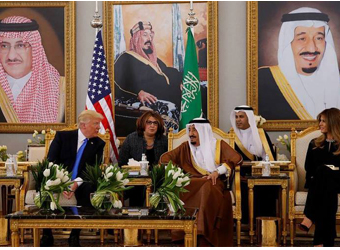Dogged by controversy at home, President Donald Trump opened a nine-day foreign trip on Saturday in Saudi Arabia, looking to shift attention from a spiraling political firestorm over his firing of former FBI Director James Comey last week.
With delicate diplomatic meetings facing him, including three summits, Trump faces a challenge of advancing his “America First” agenda without alienating key allies during his first trip abroad.
Stepping off Air Force One in 100-degree heat with his wife, Melania, Trump and his entourage received a red-carpet welcome from Saudi King Salman.
The trip has been billed by the White House as a chance to visit places sacred to three of the world’s major religions while giving Trump time to meet with Arab, Israeli and European leaders.
But uproar in Washington threatened to cast a long shadow over the trip. His firing of Comey and the appointment of a special counsel to investigate his campaign’s ties to Russia last year has triggered a stream of bad headlines.
The New York Times reported Trump had called Comey a nut job in a private meeting last week in the Oval Office with Russian Foreign Minister Sergei Lavrov and U.S. ambassador to the United States Sergei Kislyak. Flynn’s contacts with Kislyak last year were a factor in triggering a federal investigation and he was fired in February.
The White House did not deny the report, but said the “the real story is that our national security has been undermined by the leaking of private and highly classified conversations.”
After a royal banquet, Trump and the king were to have private talks and participate in a signing ceremony for a number of U.S.-Saudi agreements, including a $100 billion deal for Saudi Arabia to buy American arms.
National oil giant Saudi Aramco expected to sign $50 billion of deals with U.S. companies on Saturday, part of a drive to diversify the kingdom’s economy beyond oil exports, Aramco’s chief executive Amin Nasser said.
Trump is to deliver a speech on Sunday aimed at rallying Muslims in the fight against Islamic militants in Riyadh on Sunday. He will also attend a summit with Gulf leaders as part of the six-nation Gulf Cooperation Council.
Shortly after taking office, Trump had sought to block people from several Muslim-majority nations from entering the United States, but the travel ban has been blocked by federal courts.
The 70-year-old president’s travel to Saudi Arabia, Israel, Italy and Belgium will be Trump’s longest time away from the White House since he took office four months ago.
Even his hand gestures were likely to draw scrutiny in the Middle East, where the thumbs-up sign, a signature move of Trump’s, is considered taboo.
The uproar over Comey’s firing was unlikely to go away.
“It’s almost always true that when a president goes on a big foreign trip, especially one that has some important summits … that that dominates the news and knocks most other stuff out,” said Republican strategist Charlie Black.
Trump, who has expressed a desire for friendlier relations with Moscow, drew a storm of criticism this week when it emerged that he had shared sensitive national security information with Russia’s foreign minister during a meeting last week in the White House.
The president was already under attack for firing Comey in the midst of an FBI probe into Russia’s role in the 2016 election and possible collusion with Trump campaign members. Moscow has denied any such interference. Trump has denied collusion and denounced the appointment of a special counsel as a witch hunt.
His fellow Republicans in Congress have expressed frustration that Trump’s pro-business economic agenda, highlighted by a plan to cut corporate and individual taxes, have been pushed to the backburner by the turmoil.
“He clearly did have a bad two weeks. And clearly it’s my hope that he does … right the ship, that he improves so that we can just get going,” Republican House Speaker Paul Ryan said on the Hugh Hewitt radio show on Friday.
Source: Reuters
